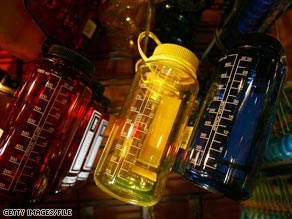Groups Raise Questions About the Safety of Bisphenol A

Reviewed by Louise Chang, MD
Sept. 16, 2008 — Researchers and environmental groups attacked the FDA for concluding that a widely used plastic ingredient is safe for humans, saying the agency ignored critical studies showing potential ill health effects.
The comments came at a hearing called by the FDA to examine the science around bisphenol A (BPA). The chemical is used in hard plastic products, including some baby and water bottles, and is also used to line metal food cans.
A growing number of advocacy groups and some members of Congress have called on regulators to ban bisphenol A.
FDA: BPA Exposures Safe
A recent draft report by FDA scientists concluded that the amount of BPA humans typically consume in food and drinks does not pose a health risk.
Craig Henry, chief operating officer for the Grocery Manufacturers Association, submitted testimony at the hearing that the FDA performed a thorough, well-documented review of the available toxicological information. He said the research used a sound analytical approach and that the FDA’s evaluation of the science on BPA was comprehensive.
And Steven Hentges, PhD, a scientist with the American Plastics Council, called the FDA’s preliminary review “completely appropriate.” He also said the industry supports more research into alleged brain and other health effects of BPA.
But several scientists have warned that the agency had discounted studies suggesting health effects in animals at BPA levels far below what regulators say are safe.
“Since these food containers are not proven safe, the FDA should not be assuring us that they are safe,” said Diane Zuckerman, head of the National Research Center for Women and Families. “It does feel like there’s been a rush to judgment.”
BPA Critics Urge Caution
Critics pointed to five studies linking BPA exposure in brain alterations and abnormal prostate growth in rodents. Those effects were seen at levels many times lower than what the FDA concluded is safe for people.
BPA has been studied for years. But researchers struggle with the fact that most studies are in animals. A human study released today linked urinary levels of bisphenol A to an increased risk of diabetes and cardiovascular disease in adults.
“It is very clear that that the FDA cannot conclude with certainly that BPA is safe. That option is no longer open to you given these new data,” said John Peterson Myers, CEO and chief scientist at the group Environmental Health Sciences.
Some researchers criticized the FDA for concluding that ordinary BPA exposure is safe for infants, who may consume it daily if they are drinking formula from a plastic bottle.
Frederick vom Saal, a toxicologist at the University of Missouri-Columbia, told an FDA advisory panel that the ability of infants to metabolize BPA has not been well studied.
“Any talk about what is going on in a newborn baby is just based on a guess, an assumption,” he said. “This is a black hole of information.”
BPA Critics Urge Caution continued…
FDA officials said they have begun discussion with other scientific agencies, including the CDC, to continue studying potential health effects of the chemical. Members of the advisory panel declined comment following the hearing.
“We’re just beginning,” said Laura Tarantino, director of FDA’s office of food additive safety. “The agency has made a commitment to look at this, and we’re going to look at it carefully,” she told reporters.
“We have not recommended that anyone change their habits or change their use of these products,” Tarantino said.
Some groups recommend people avoid boiling baby bottles to sterilize them because of concerns that the heat releases more BPA. Many bottles are also marketed free of “polycarbonate” plastic, the kind containing BPA.
Several companies have begun shifting away from its use. Several retailers, including Wal-Mart, Toys ‘R’ Us, and Babies ‘R’ Us have backed away from baby bottles containing bisphenol A. Some manufacturers, such as reusable water-bottle maker Nalgene and baby bottle maker Playtex, are ditching bisphenol A in their products.
By Todd Zwillich
WebMD Health News
Source: WebMD